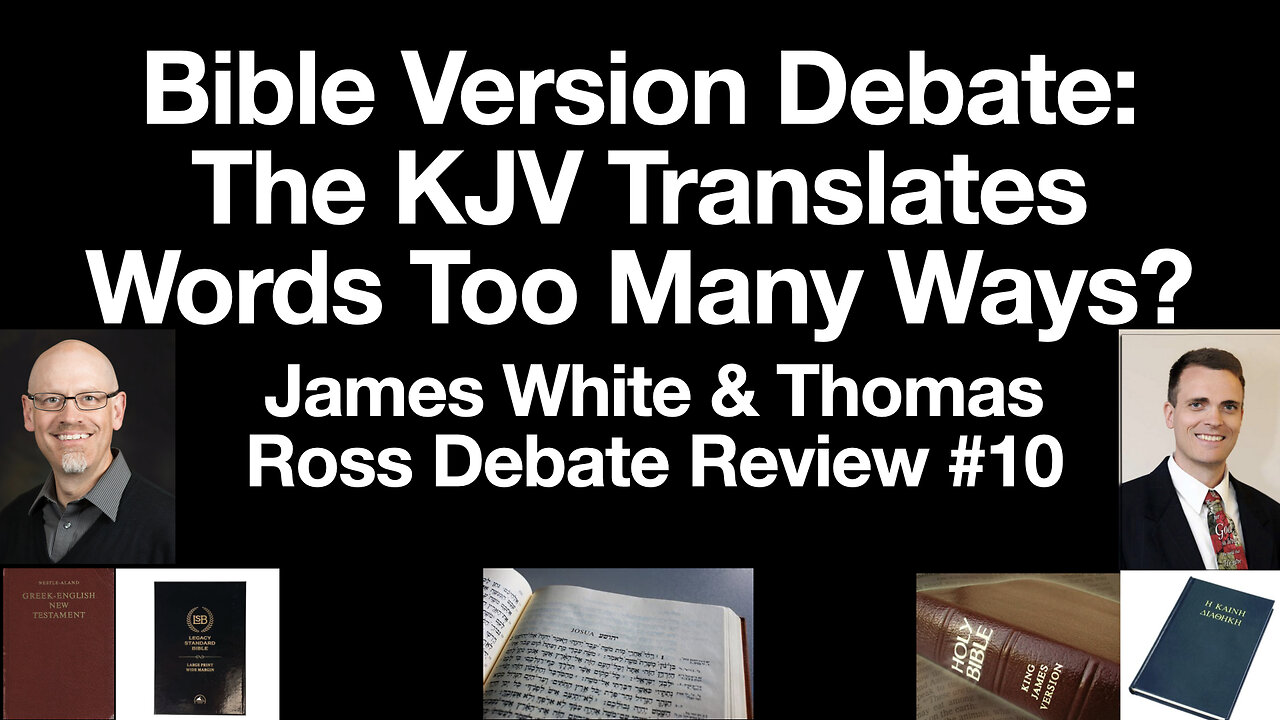Premium Only Content

James White & Thomas Ross Debate: Does the KJV Translate Words Too Many Different Ways? (Review #10)
Does the King James Version (KJV) of the Bible translate Hebrew and Greek words too many different ways? James White, in the James White & Thomas Ross debate on the preservation of the Bible, comparing the KJV and the LSB, made this claim, one also found in Dr. White's book The King James Only Controversy. This video weighs and finds wanting James White's claim.
Dr. White argued:
[T]he KJV is well known for the large variety of ways in which it will translate the same word. Certainly many times one will wish to use synonyms to translate particular terms, and context is vitally important in determining the word’s actual meaning, but the KJV goes beyond the bounds a number of times. For example, the Hebrew term for “word” or “thing” is rendered by eighty-four different English words in the KJV. Another, “to turn back,” is rendered in one particular grammatical form by sixty different English words. Those who have tried to follow a particular Hebrew or Greek term’s usage through the AV know how difficult such a task can be, and the KJV’s inconsistency in translating terms only makes the job that much harder. (James R. White, The King James Only Controversy: Can You Trust Modern Translations? pgs. 288–289)
James White’s criticism of the KJV is not serious. Students of the Hebrew language are well aware that the Hebrew word dabar, which White criticizes the KJV for translating too many different ways, is a very flexible word which appears 1,454 times in the Old Testament, according to Accordance Bible software. James provides no citation for his claim that the KJV renders dabar in 84 different ways, but immediately before this quotation he refers to Jack P. Lewis The English Bible from KJV to NIV: A History and Evaluation. Lewis makes this “eighty four” claim for dabar on page 49 of his book. Regretably, Lewis’s criticisms of the KJV contain many inaccuracies. It is unfortunate that White simply repeats Lewis’s inaccurate numbers.
Accordance documents through the word analytics in a search for [KEY H1696] that 63 different translations for dabar exist in the KJV, rather than 84—Jack Lewis is wrong, and James White’s italicized “eighty four” is wrong—and most of the time, by far, dabar is rendered “word,” while the other translations are commonly singular uses for idioms and the like. How does that 63 different translations compare with modern versions?
There are 69 different translations for dabar in the ESV, 83 different translations in the ASV, 98 different translations in the NRSV, and 173 different translations in the NET! It is unfortunate that James White appears to have simply relied on an inaccurate figure by Jack Lewis about the KJV, and then never taken the time to compare Lewis’ inaccurate 84 number with the even larger number of translations in many modern versions. (Note also that White also italicizes the claim that the verb shub, “turn,” is translated “sixty” different ways in the KJV—again, following Lewis—while he leaves completely unmentioned that, again, the ESV, ASV, NET, and NRSV all have MORE different translations for “turn” than does the KJV). If the KJV should not be used as one’s primary Bible based on James White’s argument here, how much the more must one not use the ESV, ASV, NRSV, or NET? It is unfortunate that James provides none of that context in his criticism of the KJV here. Regrettably, James’ argument here (again!) is not serious scholarship, and only sounds impressive if one is either ignorant of Hebrew or does not own a good Bible software program that enables him to compare the KJV with modern versions. The fact that Dr. White wrote The King James Only Controversy in merely a few months comes through all too clearly.
White's claim that it is very difficult to do word studies in the KJV is also nonsense. Having a word translated more than one way is very helpful for those who do not know the Biblical languages, as they get a much better sense of the semantic domain of the original language word they are studying than if the word was just rendered woodenly with one English word the entire time.
The KJV translators explained their rationale for translating words in different ways in the Translators to the Reader: "we cannot follow a better pattern for elocution than God himself; therefore he using divers words in his holy writ, and indifferently for one thing in nature; we, if we will not be superstitious, may use the same liberty in our English versions out of Hebrew and Greek, for that copy or store that he hath given us."
The KJV translators explained that when they used a variety of English words to translate Greek and Hebrew words they followed the practice of God in Scripture-Scripture employs synonyms. If Dr. White wishes to criticize the KJV’s usage, he will need to deal with the KJV preface’s argument that they are following the practice of God Himself in Scripture. James White ignores that argument completely; it remains unacknowledged and unrefuted.
-
 LIVE
LIVE
Barry Cunningham
1 hour agoPRESIDENT TRUMP IS LEADING AMERICA TO PROSPERITY! WHAT A DAY!
2,439 watching -
 LIVE
LIVE
The Quartering
37 minutes agoTrump Epstein "Bombshell" From Wall St. Journal Then Expedition 33!
1,395 watching -
 DVR
DVR
Robert Gouveia
3 hours agoTrump Polls SURGE! Fake "ICE Kidnapping" Criminal Charges! Hunter LASHES OUT!
7.93K9 -
 LIVE
LIVE
RiftTV
2 hours agoLast Catholic Church in Gaza DESTROYED, Targeted by IDF? | The Rift | with Sarah Stock & Anna Perez
809 watching -
 LIVE
LIVE
SpartakusLIVE
1 hour ago$1,000 Spartakus Gauntlet on VERDANSK for the FIRST TIME || TrulyEvil, Enzo Alder, Firefighter MDO
181 watching -
 55:21
55:21
Donald Trump Jr.
2 hours ago"Publicly" Funded Propaganda Dealt Reality Check, Live! | TRIGGERED Ep.259
112K101 -
 LIVE
LIVE
Mally_Mouse
6 hours agoLet's Play!! -- Jak 2 pt. 14!
84 watching -
 1:05:50
1:05:50
BonginoReport
3 hours agoWhite House Confirms President Trump’s Chronic Medical Diagnosis - Hayley Caronia (Ep.92)
31.4K41 -
 LIVE
LIVE
GritsGG
12 hours agoWSOW Group Stage Final Day! Most Wins 3080+! 🔥
52 watching -
 1:22:29
1:22:29
Dr. Drew
1 day agoJenny McCarthy: After Son's Near-Death Reaction & Autism Diagnosis, Star Fights For Safer Childhood Vaccines w/ Alison Morrow – Ask Dr. Drew
52.6K12